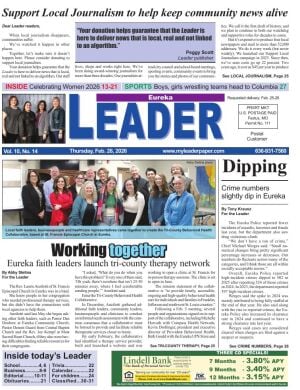Arnold Police are trying to determine who turned over unredacted closed meeting minutes to the Missouri Auditor’s Office. The minutes were the subject of a lawsuit the city had filed against the Auditor’s Office.
Mayor Bill Moritz previously said he believed the only city officials with copies of the closed minutes were himself, former City Administrator Bryan Richison, Ward 1 Councilman EJ Fleischmann and former Ward 3 Councilwoman Jessica Bess. Moritz and Fleischmann both said they did not turn over the disputed closed meeting minutes, and Moritz said he knows Richison did not turn over the documents.
Bess, who resigned from the council on July 7, said Moritz’s claim that only a few people had access to the unredacted closed meeting minutes is misleading, and that other city officials, outside legal counsel and a private developer were part of the closed meetings from which the disputed minutes were generated.
On Aug. 7, City Attorney Bob Sweeney told City Council members about the investigation, which led to the dismissal of the city suit attempting to block the Auditor’s Office from receiving the unredacted minutes from eight closed council meetings held between Oct. 6, 2022, and Sept. 5, 2024.
“Someone disclosed confidential information to the auditor making the lawsuit moot,” Sweeney told the council. “The police have already opened an investigation and are exploring charges, including the possibility of criminal charges. I hope you all take your oath seriously and that you do not violate the ordinances and laws of the city in selfish efforts.”
Missouri Sunshine Law allows public entities to keep some information closed to the public, such as litigation strategies, ongoing real estate negotiations and certain personnel matters. Arnold’s ordinances say information from closed meetings shall be closed unless the City Council votes to make them public.
When an elected Arnold official is sworn in, he or she says an oath of office, and part of that oath says the official will support “the ordinances of the city, and faithfully demean (himself or herself) in office.”
In April, Arnold filed a lawsuit in the Jefferson County Circuit Court that said the Auditor’s Office was overstepping its authority by requesting the unredacted closed meeting minutes as part of its audit of the city and two transportation development districts in connection with the now-defunct Arnold Parkway road project.
The lawsuit said the release of information from closed meetings would disclose confidential information about employees; real estate negotiations; labor negotiations; competitive bidding materials; sealed bids or documents related to negotiated contracts that are not executed; and other sensitive topics.
The Auditor’s Office had subpoenaed the city to receive unredacted closed meeting minutes as part of its investigation into the proposed Arnold Parkway, which would have been a $75 million 2-mile, two-lane road connecting two retail districts between Hwy. 141 and Richardson Road. The proposed project would have required the acquisition of 38 homes, multiple businesses and a portion of the Water Tower Place Shopping Center.
The state auditor’s filed a counterclaim in May blasting Arnold officials for attempting to delay the audit of the city, Arnold Retail Corridor Transportation Development District (ARC TDD) and the old Triangle Transportation Development District. The counterclaim also claimed the assertion that the Auditor’s Office was overstepping its authority by requesting unredacted closed meeting minutes was wrong.
Sweeney and Auditor’s Office attorneys on July 17 agreed in court to allow Jefferson County Div. 2 Circuit Judge Edward Page to review the unredacted closed meeting minutes and decide what the city could keep closed and what it had to turn over as part of the audit, which began in November.
However, the Auditor’s Office asked for the case to be dismissed on July 31, saying it had received the unredacted documents it sought and no longer needed the court to force the city to provide the closed meeting minutes.
On Aug. 5, Sweeney and Auditor’s Office attorneys asked Page to dismiss the case, and the judge granted the dismissal on Aug. 6.
If Page had ruled on what Arnold did and did not have to make available as part of the audit, Auditor Scott Fitzpatrick said his office would have appealed the decision unless all unredacted documents were ordered to be turned over.
Sweeney said he did not press for a ruling because it would have only set a precedent in Jefferson County.
“The fact that any precedent would have been limited (only to Jefferson County) made the cost a little higher than it was probably worth,” he said. “Also, in my opinion, there was little political will to drag this situation on any longer.”
Fitzpatrick previously said it is important that all those being audited cooperate and provide all records as required by law.
“Given the lack of cooperation, the decision to withhold certain documents, and some of the conflicting responses provided by the city, it’s accurate to say this audit has been more difficult to complete than what we typically experience,” he said.
Sweeney said Arnold has a legal obligation to protect all closed, confidential, privileged and proprietary information, and the auditor is only entitled to records related to the subject of the audit.
He also said by releasing information to the Auditor’s Office that may have included information about employee discipline, real estate negotiations or other litigation may have opened the city to a lawsuit.
“Any person harmed by the release of those protected documents would likely have some cause of action against the city,” he said. “To avoid this situation, the city asked the court to tell us what to do. If the court told us to release closed, confidential, privileged and proprietary information and the city got sued, the court’s order is a perfect defense.
“As this situation unfolded, the information was released, but not by the city. So, the city clearly did not take it upon itself to release the protected information. However, because this was done the way it was, there is no perfect defense, so there remains some potential for liability.”
Sweeney said he is disappointed in how the lawsuit ended.
“Some person, unhappy with the fact that the court agreed with the city that a judge should review and determine what closed, confidential, privileged and proprietary information should be disclosed, decided to take the law into her own hands and bypass the judicial system,” he said. “As a lawyer and a civic minded citizen, I don’t like vigilante actions, especially those that are selfish and self-centered.”
Fitzpatrick said the Auditor’s Office would not comment on the details of the audit until it is released to the public and that his office is working diligently to complete the report in a timely fashion.




